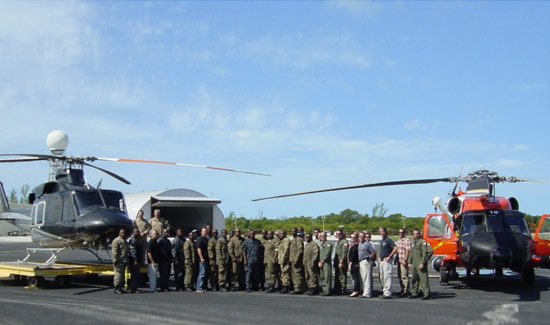
NASSAU, The Bahamas — An analysis of the illicit drug trade indicates that while drug seizures, particularly those involving cocaine, have plummeted since the 1970s and 1980s, The Bahamas still has a very serious drug problem, Minister of National Security the Hon. O.A.T. “Tommy” Turnquest said.
Mr. Turnquest said the drug problem is currently being manifested in the abuse of marijuana, especially among young people; the trafficking in marijuana and cocaine, and experimentation with the domestic production of marijuana.
“Attitudes are also driving the drug problem, particularly the thinking that marijuana is not a dangerous drug, but a recreational one. The abuse of prescription drugs is also a matter for concern,” Mr. Turnquest added.
The National Security Minister said a “host of new challenges” have come along with the changes. He said crimes associated with drug abuse and illicit traffic committed by perpetrators engaged in the illegal trade, and by persons that commit crime to support their drug use and addiction, are a challenge to the criminal justice system. A significant number of persons currently in Her Majesty’s Prisons have been sentenced or remanded on drug charges.
“The numbers of illegal activities increasingly being associated with the drug problem are well known. They include illegal immigration, migrant smuggling and the trafficking in illegal firearms. The trafficking of illegal guns is particularly egregious, because of the crime and violence they engender in the country,” Mr. Turnquest said.
“I want to emphasise here that countering drug trafficking and drug abuse is an integral part of the Government’s stepped up wider crime strategies. The objectives of our crime strategies are to stop violent crime, especially murder, that a small group of wrongdoers are inflicting on our country, and bring them to justice,” Mr. Turnquest added.
The National Security Minister said the five-year National Anti-Drug Strategy, 2012-2016 will help address many of the issues relating from the illicit drug trade and the fall-out contained therein, including transnational crimes.
He said planners “took the fact that” the serious drug problem with which The Bahamas has wrestled since the 1970s still looms large and that drug traffickers continue to use “our territory” for the transit of their destructive cargoes from source and supply centres in Central and South America and the Caribbean to lucrative markets in North America, in developing the Strategy.
The country’s archipelagic configuration and strategic location off the southern coast of the United States and on air routes to Europe, which makes The Bahamas “a particular target” for illicit transit trafficking, was also taken into consideration.
“This is the framework in which action will be taken over the next five years to counter the illicit production, trafficking and abuse of narcotic drugs and psychotropic substances. Its principal focus is on building collaborative partnerships to curb demand, reduce supply, disrupt trafficking networks, and promote healthy drug-free lifestyles, especially among youth,” Mr. Turnquest said.
“We know, however, that today we fight drug abuse and illicit trafficking in a markedly different and more dangerous environment. We understood how important a new and critical appraisal of the drug problem was to the Strategy exercise, so as to come to terms with the new manifestations of the drug problem that would be incorporated into the Strategy. Consequently, we turned to those having direct responsibilities and interest in the area of drug abuse and illicit trafficking.
“Their critical insights assisted in defining and analysing the country’s drug problem and in thoroughly evaluating key issues in this area. The outcomes of those consultations are encapsulated in the Strategy’s courses of action,” Mr. Turnquest added.
By Matt Maura
Bahamas Information Services


